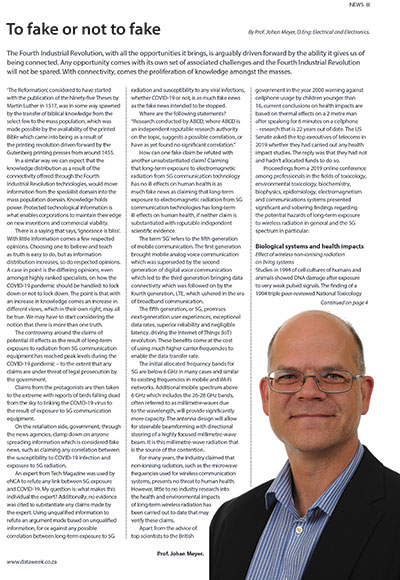
I take exception to the article ‘To fake or not to fake’ published in the June edition of Dataweek that is clearly based on the principle ‘guilty until proven innocent’.
I am by no means an expert in the field of the effect of non-ionising radiation on living organisms, however I hold a PhD in medical physics and have over thirty years’ experience (twenty of those as a Professor) in radiotherapy and as such am quite knowledgeable on the effect of ionising radiation on humankind. One of my students also sat for a Masters degree in radiobiology to study the effect of RF radiation on human sperm and, while I was not directly involved, to my knowledge she could not induce any significant changes and the work was never published.
There may well be deleterious effects on a human being when exposed to high intensity 26-28 GHz electromagnetic radiation, however the right question to ask is not “can a certain technology harm you?” but rather “do the benefits outstrip the risks?”
Ionising radiation has received such a bad rap over the years that we are reaping way too few benefits from it. The use of radiation in the treatment of non-malignant conditions is a perfect example. It is a well known fact that low doses of radiation can break the cycle of inflammation and have been used for the (only effective) treatment of tennis elbow (a very painful and debilitating condition). It is therefore a logical conclusion that low doses of radiation would be an effective weapon in the arsenal against Severe Acute Respiratory Syndrome (SARS) as experienced by high-risk COVID-19 patients.
My colleagues still in academia in South Africa have battled to try and run a trial to test this hypothesis but have been stonewalled by the very same attitude expressed in the article referred to. They gave up; but fortunately the trial was run in Atlanta (at the Winship Cancer Institute, Emory University Hospital, and supported by a report published in June 2020) with amazing results. The really worrying fact is that this has not been jumped on by the media (fake or not fake?).

The risks posed to human health by ionising radiation are well known for high doses, but to this day, after thousands of publications, the jury is still out on the risk of low doses. There is credible evidence that, in certain cases, low levels may well have beneficial effects (read up on the topic ‘radiation hormesis’). We understand the basis and mode of damage for ionising radiation yet are still struggling to understand the complexities posed by a living organism that can identify and repair damage.
To quote Hemmingway: “The world breaks everyone and afterward many are strong at the broken places.” It is highly unlikely that any credible risk assessment would emerge on the effect of non-ionising radiation in our lifetime (even our children’s). This is due to two factors: we do not understand the basis and/or mechanism for the damage/changes and the risk is so low that it will take massive numbers to show itself.
We are constantly encouraging entrepreneurial endeavours, which by their very nature are based on taking risks. We are weighing the risk of being involved in a traffic accident against the benefits of getting to places fast. Why then are we so afraid of the risks posed by all forms of radiation? We should embrace the cleanest and most abundant energy source provided by nuclear reactors, and soon fusion reactors, and roll out 5G technology. Just simply publish where the antennas will be placed and those with a particular aversion to it can live in a Faraday cage and avoid the areas close to the antennas. I bet you the rest of us will still live longer and healthier than them.
Allow me to rewrite the last two sentences of the referenced article: “If anyone claims long-term exposure to electromagnetic radiation (by the way it should read ‘non-ionising electromagnetic radiation’ since everyone know gamma rays can kill) pose ill health consequences (again a very nebulous term - reversible? fatal?), I, as a responsible scientist, should ask “Do the benefits outweigh the risk?” After all it is my responsibility to advance and improve life and living conditions.”
Sincerely,
Ado Janse van Rensburg

© Technews Publishing (Pty) Ltd | All Rights Reserved